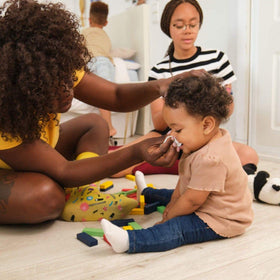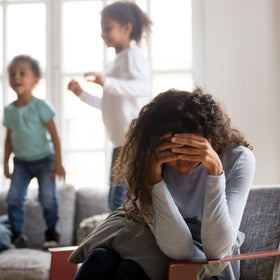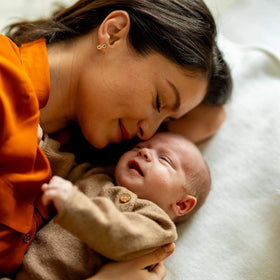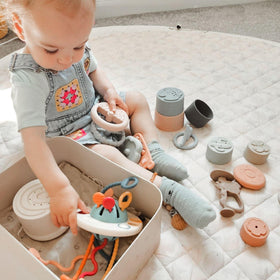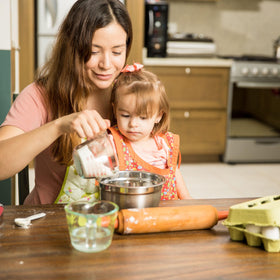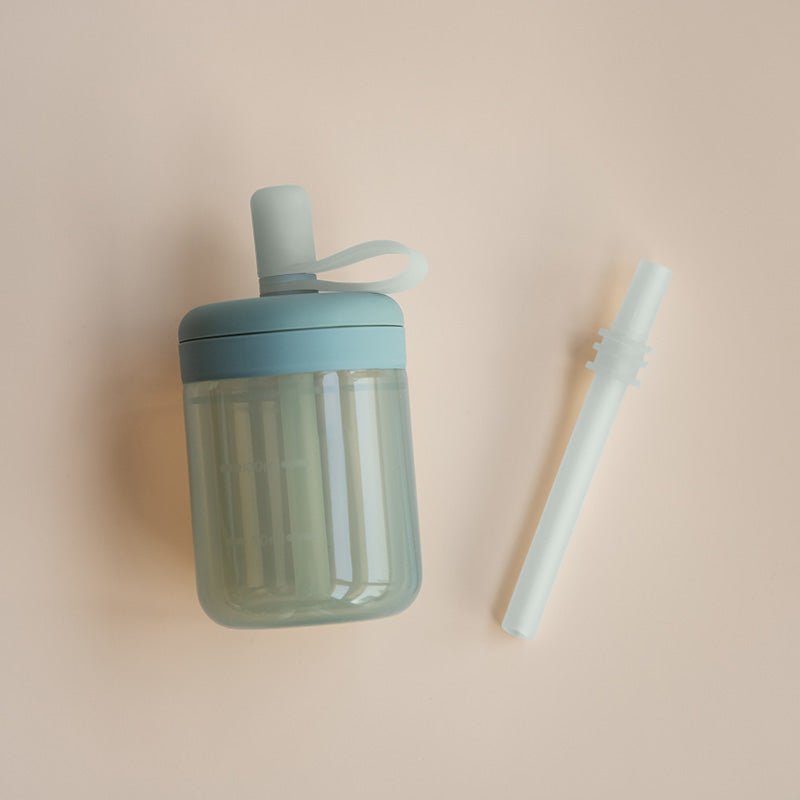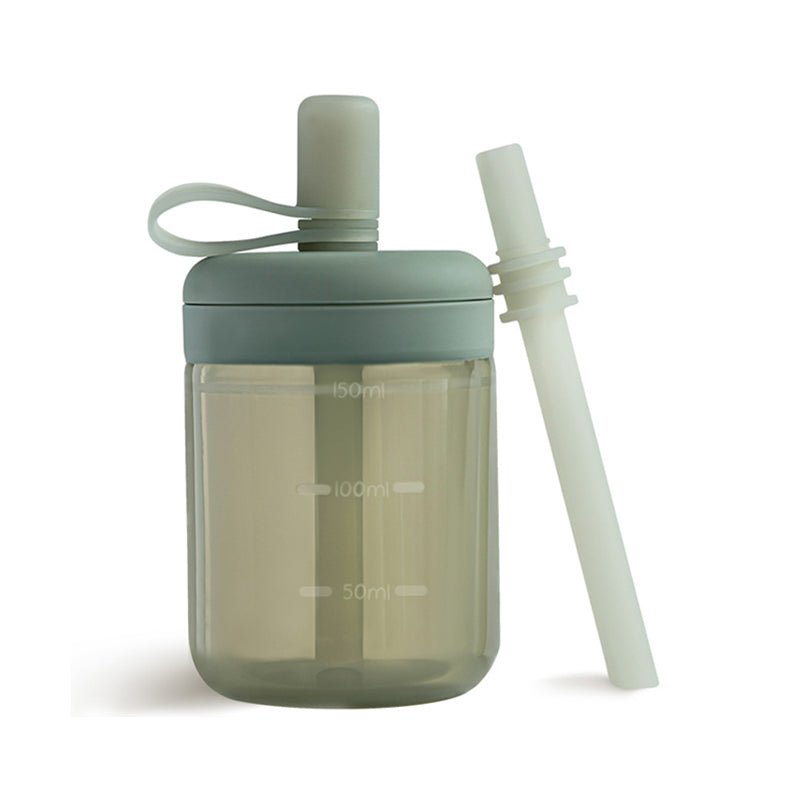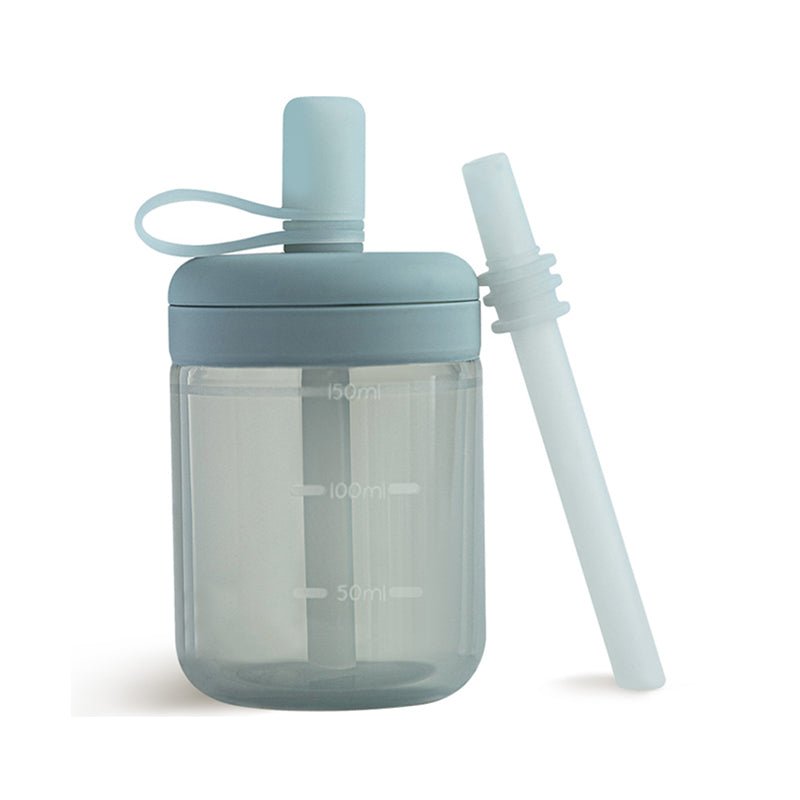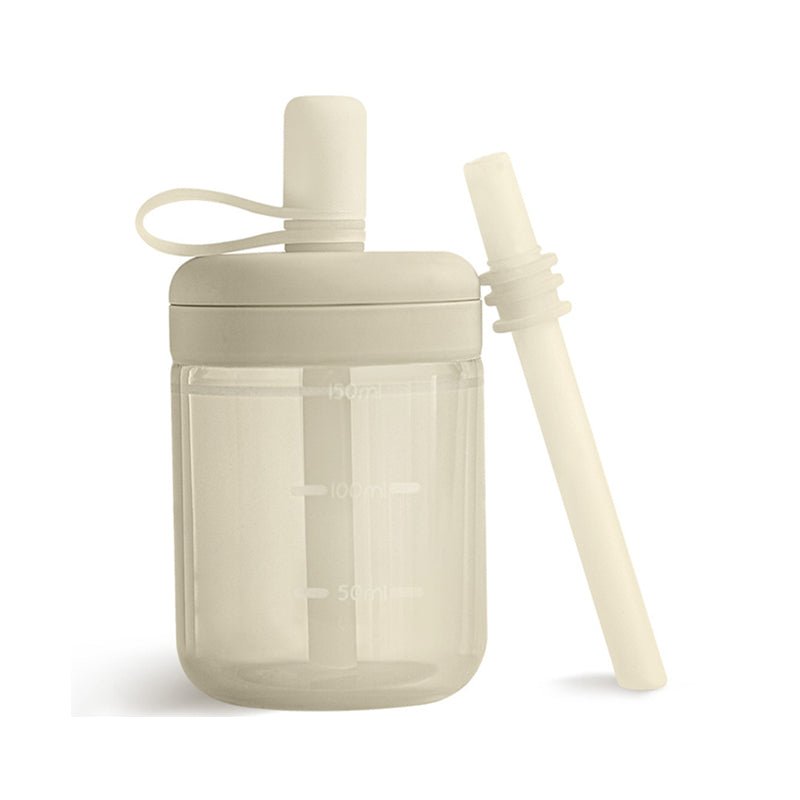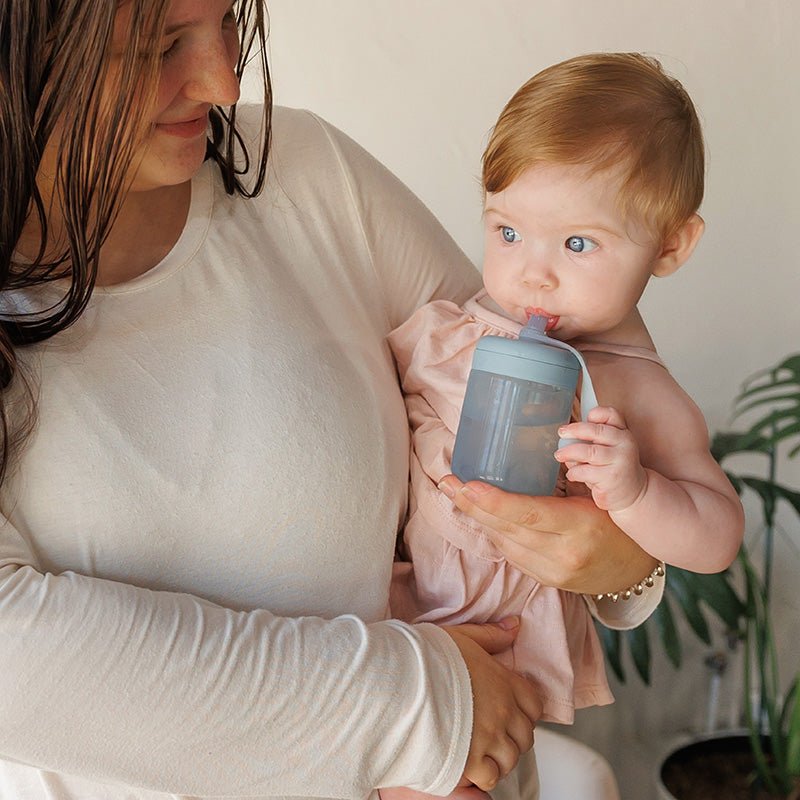Holding that sweet newborn after months of pregnancy is a precious moment. After birth, your little one is in the world, and, try as you might, you can no longer protect your baby from everything. The first test: vaccinations.
Vaccination is an efficient and safe way to protect your baby from diseases before contacting them. Vaccines contain dead or weak germs from viruses or bacteria that the immune system will create antibodies against. So, should your baby contact the disease later in life, she can already fight it.
Understandably, however, parents have tons of questions about injecting their baby with so many vaccines in the first year of life. Is it wise to expose a baby to so many diseases, viruses, and vaccine preservatives at such a delicate age?
DISCLAIMER: I am NOT a doctor, trained physician, medical researcher, or anything of the sort. The following is a culmination of my research as a detail-oriented, concerned parent who has gone through this process multiple times with each kid in different parts of the world.
You should always talk to your baby's pediatrician about vaccines and any reservations you have about them. This article is simply a guide to help you form those questions into more specific and actionable questions for a more productive conversation. Let's get into it.
How Does a Vaccine Work?
Vaccines are an incredibly clever way to train the body's immune system to identify invading germs, viruses, and bacteria, create antibodies against them, and remember how to fight them later.
However, vaccines do not "give" the body antibodies; they contain dead or weak bacteria or viruses for the body to naturally train against by identifying the invaders, creating antibodies against them, and fighting them off.
The invading germs from a vaccine are not strong enough to make one sick, which is the issue many parents struggle with, particularly when they see their little one's vaccine schedule includes diseases a baby shouldn't have contact with until adulthood (like Hepatitis B) or multiple doses of the same disease (DTaP, RSV, PCV, Hib, Rotavirus, HepB).
Brilliantly, the immune system remembers previously identified diseases and how to fight them well. Thus, introducing a baby to a region's most common diseases through vaccines will ensure they have an equipped immune system for years (source).
Vaccines equip your child's immune system to fight diseases before contracting the disease instead of after.
Why Don't Some Vaccines Last?
How vaccines work sounds well-designed and clever until you think about the flu and COVID-19 vaccines. Why don't these vaccines last more than a season? Is the protection they afford worth the pain they cause your baby?
Some diseases, viruses, and infections evolve seasonally into different "strains" or forms of the same thing. For example, if you got the flu last year, you could get the flu again this year because the influenza virus has already evolved to overcome your body's previous influenza antibodies.
That means you have to either suffer through the flu each season (unless you are lucky enough to avoid it) or receive a flu shot with the coming season's "new and improved" influenza virus to train new antibodies in your immune system (source). The same holds true for your little one.
Many people complain about feeling ill or "icky" after getting a flu shot, but this immune response will likely be far less intense than contracting fully alive influenza germs. Rest assured, your body is working to identify the virus, creating antibodies against it, and fighting back so that you will be protected all season.
If you are worried about giving your little one the seasonal flu shot or COVID-19 vaccine, know that you can opt out of them and take extra precautions in your lifestyle to reduce the chances that your baby will catch them. Nonetheless, discussing your concerns with your pediatrician is crucial to making a solid decision.
Natural Immunity vs. Vaccination
Is building natural immunity to some viruses better than vaccination? I'm not talking about using herbs, diet, and exercise here---I'm talking about contracting a disease or virus naturally and fighting it off. Does this last longer than vaccination?
It is vital to understand that building natural immunity through exposure to viruses and diseases is similar to vaccination. Both routes cause the immune system to identify the nasty germs, create antibodies, fight off the germs, and remember the pattern for next time.
The only difference is that vaccination accomplishes this with weak or dead germs, so one may not even feel ill while the process happens. Building natural immunity requires exposure to germs through contracting the virus or disease at full strength or being exposed to germs in the environment, but not enough to get fully sick.
Does one method result in longer immunity? Not really. Some diseases and viruses are "one-and-done" varieties, meaning that once a person has suffered through them, they will probably never contract them again. Examples of such are measles and hepatitis A.
However, most viruses evolve to get around our natural defenses, so viruses like the flu, COVID-19, RSV, and the common cold will come back again and again regardless of how many times you've caught or vaccinated against them (source).
Relying solely on vaccines or natural immunity is a terrible idea, especially for little ones. So, leading a healthy lifestyle with a nutritionally rich diet, regular exercise, and proper hygiene practices is our best first defense. Our immune systems will then be better nourished and able to do their job.
Keeping your baby's toys, cups, and dinnerware clean and sterilized is essential to minimizing exposure to harmful bacteria. This is why we create our baby products from 100% high-quality food-grade silicone--they are a cinch to clean and can be boiled for sterilization!
Which Vaccines Do Babies Get in the United States?
With so much excellent research, medical equipment, and trained professionals in the United States, babies born here nowadays have an opportunity to be vaccinated against viruses and diseases that have historically been extremely harmful or lethal.

Here is a generalized chart of vaccines American babies receive in their first year and a half of life (source):
Age |
Vaccines and Doses |
Newborn |
|
2nd Month |
|
4th Month |
|
6th Month |
|
12th Month |
|
15th Month |
|
18th Month |
|
This list varies by hospital, region, pediatric practices, and parental preferences, but it is a start for helping you have fruitful conversations with your pediatrician.
Depending on the precarious balance of risks and benefits for your unique baby in your area, your pediatrician may suggest spreading doses out over two years, adding another vaccine, or skipping some.
Thankfully, after the list above is finished, doses and other vaccines will come years apart rather than every few months.
Why Do Babies Get So Many Vaccinations?
The list of vaccines in the first year and a half is daunting. If your little one only receives the general list of vaccinations, he will have 12 unique vaccines (including seasonal vaccines like RSV, the flu, and COVID-19), most of which come in several doses. Why? Isn't this too much on such a young immune system?
First of all, yes, a baby's immune system is still developing after birth. During the first few months, babies carry some antibodies from their mothers, but these antibodies typically do not fight diseases the mother hasn't struggled with or been vaccinated against since childhood (like polio, whooping cough, and diphtheria) (source).
The idea behind vaccinating babies heavily rests primarily on a risk versus benefit assessment. As soon as a baby is born, he is exposed to bacteria and germs everywhere. Every person who touches the baby and every thing the baby touches or puts in his mouth are covered in bacteria.
So, though vaccines expose a baby's immune system to lots of germs, they are dead or weakened germs that your baby's immune system learns to fight before exposure to a full-fledged disease.
That means your little one could learn to fight diseases and viruses without having to suffer through them and their consequences himself. Furthermore, doing so early in life ensures protection during those vulnerable first months of life.
According to America's Centers for Disease Control, "Vaccines are the best defense against infections that may have serious complications, such as pneumonia, meningitis, cancer, and even death" (source).
Is It Okay to Delay Vaccinations?
Yes, it is okay to delay vaccinations when your baby is already sick with something else. Introducing your baby's immune system to new germs doesn't make much sense when it's already busy fighting a live virus.
However, the CDC recommends sticking to the vaccination schedule as much as possible to protect other babies and children.
There is no hiding the fact that the ultimate goal of vaccination is "herd immunity" to eradicate diseases. The more vaccinated people there are, the fewer bodies viruses and diseases have to live in and mutate between.
Is it possible to actually eradicate a disease through vaccinations? Yes! The World Health Organization declared smallpox (naturally occuring) eradicated in 1980 thanks to 200 years of vaccination against it (source).
Is It Possible to Overdose a Child with a Vaccine?
Babies come in all shapes, sizes, and genetic backgrounds. So, why would we give the same standard dose of a vaccine to every baby? The answer comes down to recognizing personalized healthcare and how vaccines work.
Suppose your baby has some health complications that could possibly be exacerbated by a vaccine (for example, your baby was born weeks early or has an immune system issue). In that case, your pediatrician will likely not administer vaccines until he or she knows they won't overwhelm your baby's already stressed immune system.
It is vital to understand how vaccines work when it comes to vaccine doses and possibly "overdosing" one. I've already described that process above. It seems that giving too many dead or weak germs in a vaccine would be difficult to do, though there is little research on this topic (source).
Ensure your child's pediatrician knows which vaccines the mother received during pregnancy. This will probably knock one or two doses off your baby's early vaccine schedule.
Having an open conversation with your child's doctor is crucial to navigating your fears, your baby's health, and medical practices. If you are concerned about talking with your doctor or which "recommended" tests and vaccines you don't have to take in pregnancy, read Do I Have to Do Everything the Doctor Recommends During Pregnancy?
What Does an Allergic Reaction to a Vaccine Look Like?
A vaccine-associated allergic reaction could look like mild redness and itching of the injection site, a raised bump at the injection site, runny nose, hives, or, far less commonly, anaphylaxis. Such reactions are not as common as you would think.

Vaccine-related allergic reactions range somewhere between 1 in 50,000 and 1 in 1,000,000, depending on the vaccine and a number of other factors. A severe reaction of anaphylaxis is rare: 1 in 100,000 to 1 in 1,000,000 (source).
A reaction could be to the vaccine's antigens (germs), preservatives, stabilizers, or something else. You can ask your child's doctor for a specific list of possible allergic reactions or irritation to each immunization your baby receives during a visit.
If your baby shows signs of abnormally high fever (over 102), weakness, difficulty waking up, swelling of the mouth, throat, or face, difficulty breathing, lots of uncontrolled crying (for hours at a time), or seizures within three days of receiving a vaccine, call your doctor. Go to the ER if symptoms increase or persist.
Can I Refuse Certain Vaccines in the U.S.?
Yes, you have the right to refuse some vaccines in the U.S., but do so with excellent research and caution. Not vaccinating your child could result in not being accepted into certain daycares or public schools due to state requirements.
Ensuring every student is vaccinated helps prevent the spread of diseases and viruses, so getting your child vaccinated with the required vaccinations will keep her and her classmates healthier.
However, there is a list of things that make parents waver about vaccines and even refuse them. Here are a few:
Antibiotics in some vaccines
Aluminum in some vaccines
Sugars, amino acids, and proteins in some vaccines
Fetal bovine serum in some vaccines
Chemical preservatives in some vaccines
Formaldehyde in some vaccines
A family member has had an allergic reaction to a vaccine before
Someone they know contracted the virus or disease after getting a vaccine
Distrust in pharmaceutical companies
Distrust in government
The belief that "herd immunity" does not consider the individual
The belief that the risks of vaccine side effects or reactions outweigh the benefits
The belief that babies need more time to develop before having any injections
No reason their baby should come into contact with the disease
If you are concerned about the additives in vaccines, read the FDA's explanations in Common Ingredients in FDA-Approved Vaccines to start a conversation with your child's doctor.
Are you scheduled for a cesarean delivery? Learn about what happens in the operating room and after delivery for you and your baby in 15 Questions First-Time Cesarean Delivery Parents Ask. Talk about medication, your baby's first vaccines, and more before your due date!
What Are the Risks of Avoiding Vaccinating My Child?
Avoiding vaccines for your child could mean that your child has no defense when she comes into contact with a particular disease or virus. At such a young and tender age, no immune system preparation could result in great difficulty since babies cannot have much medication.

I was nervous about the requirement for my firstborn to receive a tuberculosis vaccine as an infant while we lived in Asia because it was not required in the U.S.
However, the prominence of tuberculosis in the older generations of that area and the culture of the elderly fussing over random strangers' babies in public made the risk of forgoing the vaccine too high.
All someone would have to do is cough on my son while saying hi, and he could contract the infection, which would have put the rest of the family at risk, too.
Always weigh the risks and benefits of a vaccine after doing serious research and questioning your child's doctor. Vaccines shouldn't be taken lightly, but avoiding them altogether could be more detrimental to your child and others.
In a Nutshell
Babies receive many vaccines before the age of two. This beneficial practice sounds counterintuitive to some parents, but solid research and practice attest to the effectiveness of vaccinating babies, even vaccinating them against multiple diseases in one visit.
Leave vaccination days fairly open so you can comfort your little one and take care of any fussing or restless naps. Discomfort and fussiness are common on vaccination days, especially if your baby is also teething.



















































